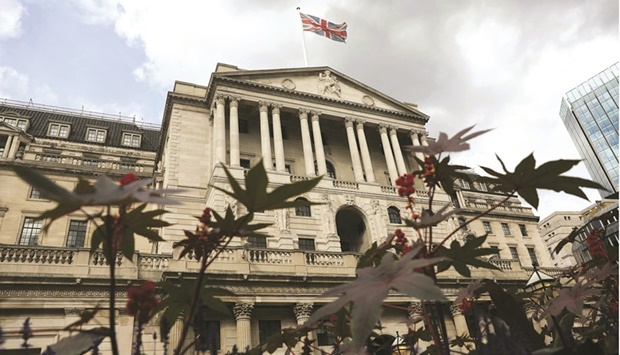The Bank of England hiked its interest rate sharply again Thursday to combat decades-high inflation but warned the UK economy was slipping into recession.
The BoE’s second half-point increase in a row follows this week’s super-sized rate hikes from the US Federal Reserve and other global central banks, as policymakers seek to tame red-hot consumer prices.
The BoE met most market expectations as it lifted its key rate by 0.5 percentage points to 2.25%, repeating its August move that had already taken borrowing costs to a 14-year high.
And it noted the inflation outlook improved as a result of British Prime Minister Liz Truss’s plans to freeze energy prices for businesses and households — and ease the nation’s cost-of-living crisis.
“The bank rate is now at the highest level since 2008 as the Bank of England attempts to curtail spiralling price rises with inflation just shy of double digits,” said Interactive Investor analyst Victoria Scholar.
The bank also indicated the UK economy would likely shrink in the current third quarter, or three months to the end of September.
That would place it in recession after it contracted by a slender 0.1% in the previous three months.
The technical definition of a recession is two straight quarters of negative growth.
The bank meanwhile forecast inflation to peak next month at 11%, downgrading its prior guidance of 13%.
“Since August, wholesale gas prices have been highly volatile,” the BoE said in minutes from its gathering. “Uncertainty around the outlook for UK retail energy prices has nevertheless fallen, following the government’s announcements of support measures including an energy price guarantee.” Markets are on tenterhooks, with Britain set Friday to deliver a mini-budget that will seek to boost economic activity and help cushion the cost of living.
Finance Minister Kwasi Kwarteng, fresh from being appointed by Truss, is expected to reverse her predecessor Boris Johnson’s plan to hike taxes on company profits and salaries.
Commentators also warn Truss’ huge spending plans will ravage public finances that are already reeling from huge spending during the deadly Covid pandemic.
Barclays bank analysts estimate that the government’s total cost-of-living expenditure could reach a colossal £235bn ($267bn). UK inflation eased in August to 9.9% after striking a 40-year peak of 10.1% in July.
Yet it remains elevated largely as a result of surging energy prices following key producer Russia’s invasion of Ukraine.
Some commentators had speculated that the BoE could mirror the European Central Bank and the US Federal Reserve and spring a hike of 0.75 percentage points — which would have been the BoE’s largest in three decades.
Across the world, consumer prices have galloped to their highest levels in decades on Ukraine fallout.
Central banks have responded by increasing their rates, fanning recession fears because they push up loan repayments for consumers and companies alike.
After a jumbo rate hike in Sweden earlier this week, the Swiss and Norwegian central banks announced big increases just ahead of the BoE decision, all citing inflation concerns.
The BoE earlier this month defended itself against accusations of being too slow to tackle sky-high inflation, after Truss proposed to review its operational independence.
The BoE has now lifted rates seven times since it began in December to tighten borrowing costs from a record-low level of just above zero.
Thursday’s decision had been postponed from last week following the death of Queen Elizabeth II.
Five members of the bank’s nine-strong monetary policy committee including governor Andrew Bailey voted in favour of the hike.
Three others called for a larger 0.75-percentage-point rise, while one lone voice called for a smaller gain of just 0.25 percentage points.

A general view shows Bank of England (BoE) in the City of London on Thursday. The bank has indicated the UK economy would likely shrink in the current third quarter, or three months to the end of September. That would place it in recession after it contracted by a slender 0.1% in the previous three months.
